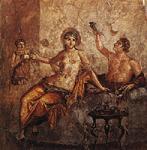Catullus 5
A vividly impassioned (and enlightening) analysis of Catullus’ Poem No. 5 from humanities.classics:
“There is not enough room on the Internet to say everything that could be said about this poem. It may be one of the greatest poems ever written. Elision […] is rampant; liquid consonants abound. Read aloud, it is truly beautiful.”
“And why the elision and the liquids? Because it is a poem of seduction, of intercourse, of sexual climax and, finally, of the sigh that follows orgasm. ‘Lesbia’ is the nickname that Catullus gave to the married woman he was in love with […] the poet Sappho who lived on the island of Lesbos.”
“The seduction ends with the long slow line ‘Nox est perpetua una dormienda.’ The love making begins with the kisses, rises to a climax with the exploding ‘b’s in ‘Conturbabimus illa’ and coasts to a close in the last two lines.” ‡
Vivamus, mea Lesbia, atque amemus,
Rumoresque senum severiorum
Omnes unius aestimemus assis.
Soles occidere et redire possunt:
Nobis, cum semel occideit brevis lux,
Nox est perpetua una dormienda.
Da mi basia mille, deinde centum,
Dein mille altera, dein secunda centum,
Deinde usque altera mille, deinde centum,
Dein, cum milia multa fecerimus,
Conturbabimus illa, ne sciamus,
Aut ne quis malus invidere possit,
Cum tantum sciat esse basiorum.
Hear the poem being read aloud in both the original Latin and in an English translation here.
A translation:
Let us live, my Lesbia, and love, and value at
one farthing all the talk of crabbed old men.
Suns may set and rise again. For us, when the
short light has once set, remains to be slept and the sleep
of one unbroken night.
Give me a thousand kisses, then a hundred, then
another thousand, then a second hundred, then yet
another thousand, then a hundred. Then, when we
have made up many thousands, we will confuse our
counting, that we may not know the reckoning, nor
any malicious person blight them with evil eye, when
he knows that our kisses are so many.


